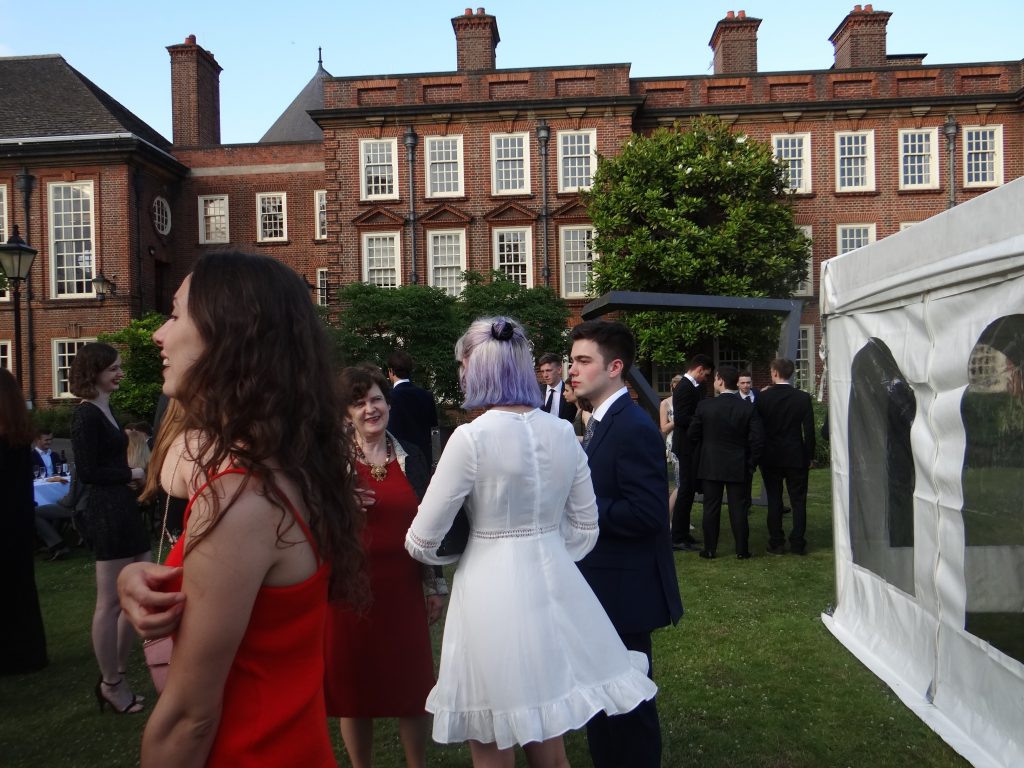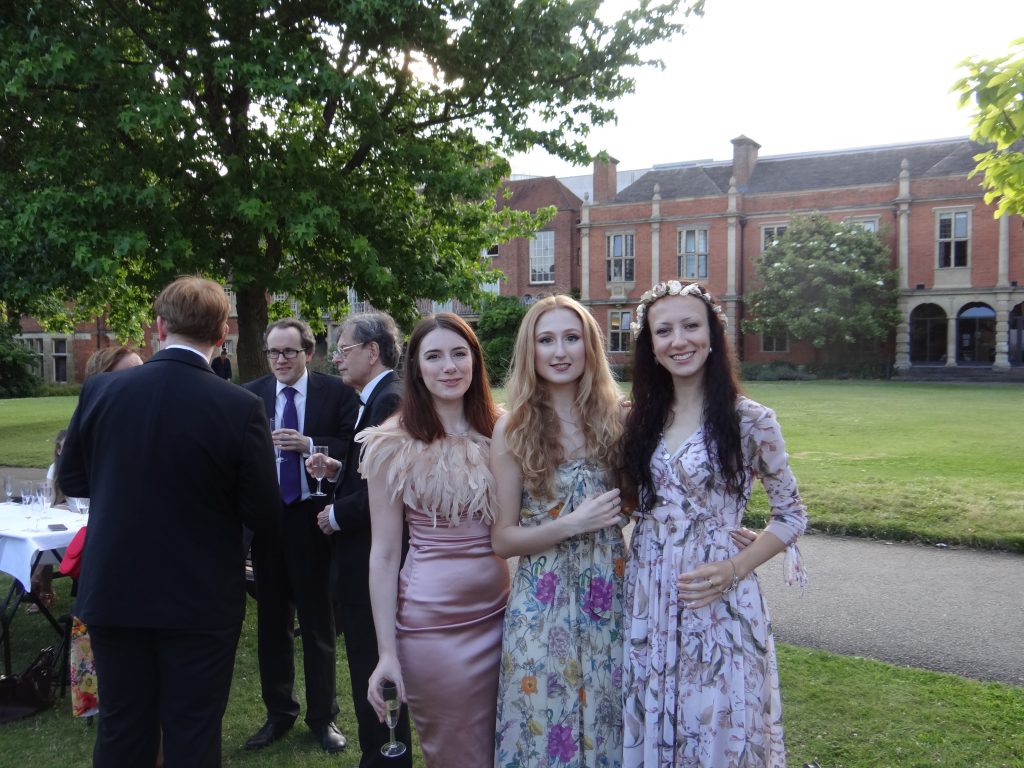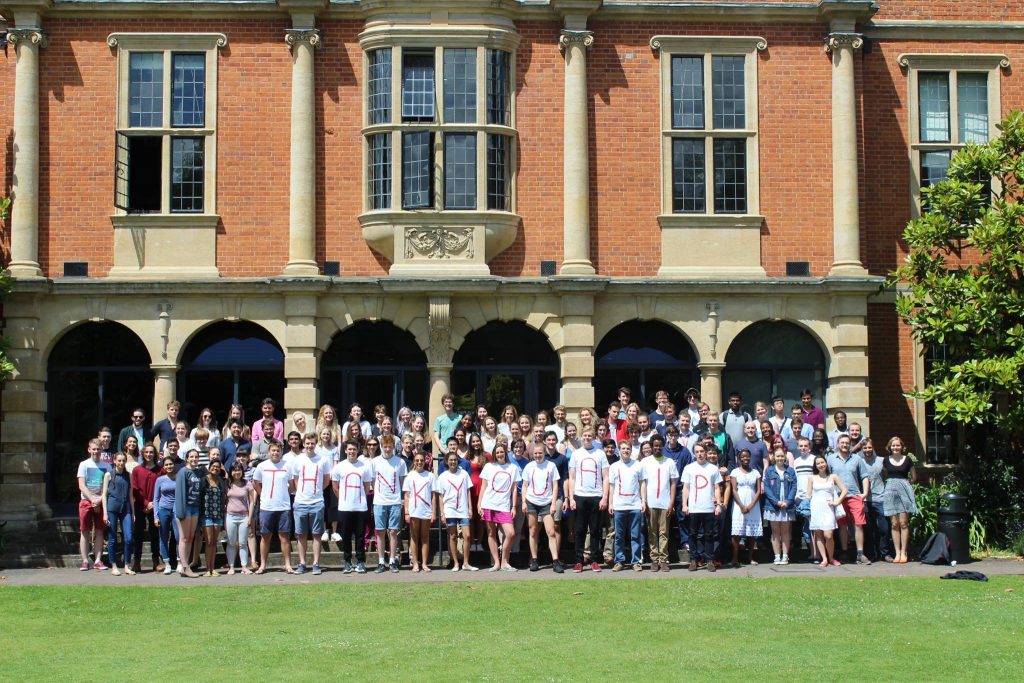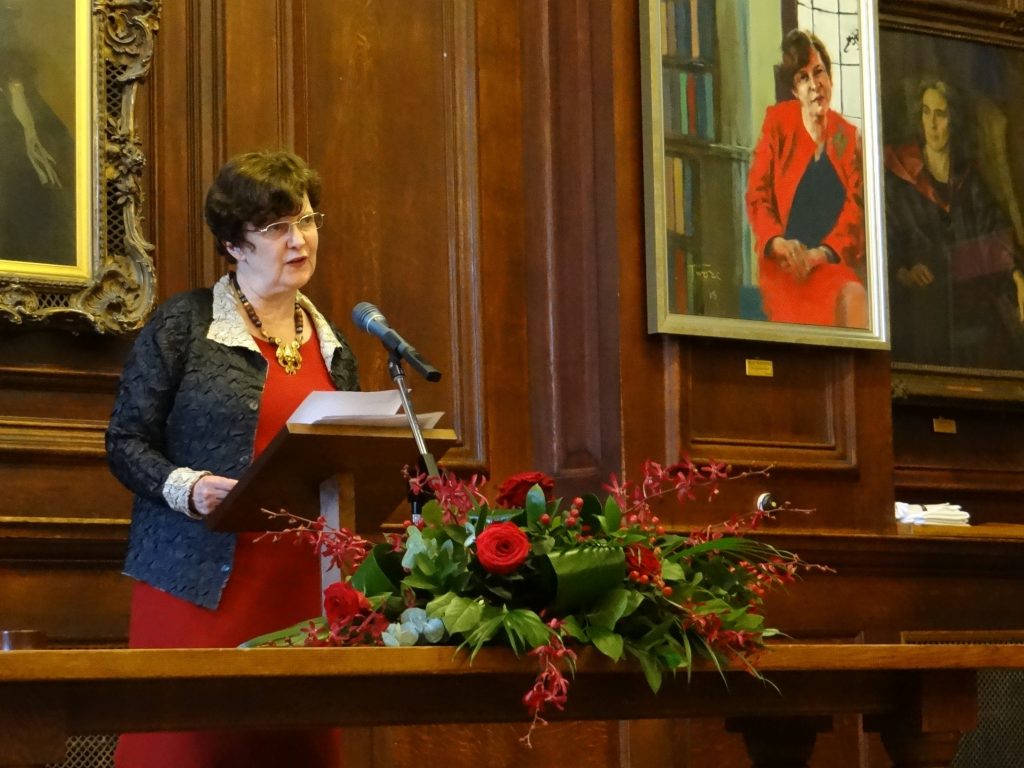 A transcript of Principal Alice Prochaska’s address to Somerville’s graduating students at the 2017 Leavers’ Dinner.
A transcript of Principal Alice Prochaska’s address to Somerville’s graduating students at the 2017 Leavers’ Dinner.
It is one of the great pleasures of my life as Principal to see all of you gathered together in this hall resonant with the celebrations of generations of Somervillians. It was great to welcome you here as Freshers, and now to see you all about to leave is sad, because you will miss each other and the college will miss you. It is also triumphant, because we feel we have a share in your past and future successes. At this point, just after a gruelling set of exams for most of you, simply finishing your course at Oxford must feel like a triumph, and it is. My warmest congratulations to all of you.
I hope you are all looking forward to a good summer and to the next stages in your careers. I know some of you are going on with scarcely a break, to challenging internships, training contracts, and further training. Most, I hope, will get a chance to draw breath after the breakneck pace of Oxford life: whether you are following up with work in finance and industry, or the civil and diplomatic services, or in teaching or further academic study. And inevitably for some there will be anxiety and disappointment, before you find the next step on your path to the wider world.
As you look back on your years at Somerville, there will be a merciful oblivion, I’m sure, for some episodes in your lives: the unhappy aftermath of a bop, disappointments in the room ballot, sports matches that didn’t go quite right, tutorials that were more than just intellectually bracing, and relationships that fizzled out. But overwhelmingly, the memory cherished by Somervillians I meet with over the years is that of the friendships they have formed here. It may be my imagination, but I believe at present the college’s friendship groups are even stronger than in previous years. I certainly have the impression of a cohesive, pragmatic, friendly third and fourth year, as artistic and creative and inventive and entrepreneurial as every cohort of Somervilians always is, but also at least as compassionate and supportive to each other as any group I have known.
I am always deeply impressed as well, by the public and civic spirit that Somerville students display. You have volunteered for service during the summer in almost every part of the globe, from many different parts of Africa, to India, China and the United states. Closer to home, many of you give your time to helping homeless people, reading to prisoners, campaigning to improve the environment, and teaching immigrant children to read and speak English. There is, I believe, a record number of peer-to-peer counsellors among you, and others who help to staff Nightline. Few good works in Oxford lack a Somervillian touch. And in all that you do, I believe you will have learned to value excellence, and always to ask a bit more of yourselves than you ever thought possible.
That sense of having shared in this community at a critical point in your lives is something that deepens as the years go by. I find two remarkably consistent features about the reunions of former Somerville students that I attend here in college, in London and around the world: one is that in any group of Somervillians you will find every one prepared to deliver a piece of his or her mind, sometimes repeatedly, and always with emphasis. I sometimes liken Somervillians to the thistles that our gardeners tend to such good effect; we grow tall, noble, aspiring and of course beautiful (or some of us do) but you must approach us with caution because we can be spiky. The second universal feature – not altogether incompatible with thistledom, is that Somerville graduates are always keen to meet each other, even when they come from widely separated years and never met before; they always seek out each other’s company and find a common bond.
You may well feel, each one of you, that you have been through many changes and much personal development while you have been here. One’s years at Oxford are inevitably transformational, and I hope you will all feel that that is true of having been at Somerville. Meanwhile, the college that you are leaving behind has been through quite a few changes itself.
There was a time when Somerville, founded along with LMH in 1878-79, was a daring experiment in a segregated and hierarchical world. In Somerville’s case it was not just that the college was one of the first two to admit women to Oxford, but it also defied convention by explicitly welcoming undergraduates from any and every social and religious background. Tucked away at a secluded distance from Woodstock Road, in the building we now call House, and approached along an avenue of tall trees beside the growing complex of the John Radcliffe Hospital, it kept a demure distance from the nearest men’s college, that bastion of ecclesiastical masculinity, Keble. Somerville students had to be chaperoned at lectures and on their rare forays to university libraries, most of which were closed to them anyway. If they had not observed those conventions, and so pacified the disapproving majority, the very notion of women at Oxford would have been dead in the water.
Fast-forward one hundred and thirty years or so, and the college has grown past recognition. Where once cows and a donkey grazed in the pastures beside Walton Street, first Park (then named West), the Library, then Maitland, Penrose, the Chapel, Holtby and in the 1960s, Margery Fry, Vaughan and Wolfson replaced the rural scene and framed our beautiful quad, where female and male students now roam free. Eventually the hospital and its jumble of buildings vacated the ten-acre site between Somerville and the Observatory, and the college found itself right at the centre of the most extensive and exciting developments in the University for a century. The ROQ buildings, West and East, were the first to be built on the Radcliffe Observatory Quarter, in 2011, followed by the Maths Institute and the Blavatnik School of Government, with a Humanities Centre and other developments yet to come. With an open vista to the Observatory where once there were just walls and roofs, Somerville is no longer the secluded social experiment or as some called it, that “Godless establishment on Walton Street” that it was when it began its life, but an open, celebrated and inclusive college at the heart of the University.
Many of you will remember the buildings I’ve mentioned fondly –and the others I must mention too: Darbishire, Hostel and the Dorothy Hodgkin Quad and Margaret Thatcher Centre, the Flora Anderson Hall and the Brittain-Williams Room, some of which commemorate great Somervillians. When you return to Somerville in years to come, as I hope you will, you’ll find a new Catherine Hughes building and new graduate accommodation which together will enable the college to accommodate all first-year graduate students and ALL undergraduates in college, on our main site, for all the years of their course: no more stressful living-out ballots and anxious searches for congenial house-mates, no more queuing overnight on cold November pavements, no more NOPS. Only two more second-year cohorts will have to endure these anxieties. I’m only sorry that all of you arrived too soon to benefit.
I am not sorry that, having established a deceased principals principle for naming new buildings, I don’t have to worry about where my own “naming opportunity” as we call it in fund-raising circles may be. Perhaps by the time I become eligible under that rule, and all of you are, I hope, very senior in your own careers, maybe one of you even a Principal yourself, perhaps by that time there will be new conventions, and the portraits here in Hall will all have been shuffled to give prominence to the more recent and illustrious, including my very welcome and eagerly awaited successor Baroness Jan Royall.
You yourselves follow in the footsteps of many generations. Last week, the choir sang beautifully for our annual commemoration ceremony for Somervillians who have died during the past year. This is a ceremony unique to Somerville, at least among Oxford colleges, and it is a magnificent testimony to the very special community that this college has created.
In years past, among fifty people or so each year, we have touched on the life stories of an Indian graduate who became ambassador to three countries during her career, a doctor who pioneered the use of penicillin during the second world war, and one woman who had founded the movement to combat uranium mining in Australia and around the world. We have celebrated distinguished doctors, writers galore, local and national politicians, teachers, academics and leading civil servants; and some of the “Bletchley girls” who studied here during or just before the second world war and were then recruited to that band of brilliant young women (often linguists or mathematicians) who decoded enemy communications and for decades afterwards kept the secret of their key role in winning the war.
Among the Somervillians who are living and active now, many of you will have met some of our Honorary Fellows at our Foundation Dinner in March. Our guests then included the writers Hilary Spurling and Victoria Glendinning, ambassador Catherine Royle and some very distinguished scientists who had worked with the Nobel-prize-winning Dorothy Hodgkin. Other Honorary Fellows who were unable to be present then include two stars of the financial world: Baroness Shriti Vadera the economist and former cabinet member, who now leads Santander Bank, and Sacha Romanovitch the chief executive of the accountancy and consultancy giant Grant Thornton. In Asia I have met among many others a biochemistry graduate from the 1980s who is CEO of a Shanghai-based company funded by Bill Gates whose one great purpose is to eradicate tuberculosis in the world. Our politicians include, of course, the great and devoted Somervillian Shirley Williams, Baroness Williams of Crosby, who has met quite a few of you here, and will be getting an Honorary Degree from the University of Oxford at the Encaenia ceremony next week.
I have spoken before about the fundamental values of diversity, tolerance and public service that characterise Somerville. It is worth just touching on those again now, as you are about to depart. This college was founded to include the excluded. It was in 1879 and it still is today a place for pioneers, and for the inveterately independent minded. It is exceptionally international among Oxford colleges, with about 25% of our undergraduates and three-quarters of our graduate students coming from outside the UK. Some of you have told me that Somerville is a “place where you can be yourself” and that it is “like home”. I hope all of you have found that to be true. It has been home to me too for the past seven years, and was so in a different way when I was an undergraduate in the 1960s. There has been no greater privilege in my life than to serve this college, and all of you, and I will miss it keenly, as I suspect you will too.
And so it remains for me only to remind you that you will always be welcome here in college, and among Somervillians wherever you may meet them. We will always want to support you and encourage you in your many endeavours, including sometimes with grants to help in the next stages of your careers. So keep an eye on our web site, include the college among your Facebook friends and follow us on Twitter: you never know when you may learn something to your advantage, and hopefully also something to be proud of. You need no further reminding of the roll-call of famous names that Somerville has produced. Some of you will be among the names we celebrate in later years. All of you will be remembered, fondly and with the deepest interest. Once a Somervillian always a Somervillian. This is a great and very special college, and it is your college.
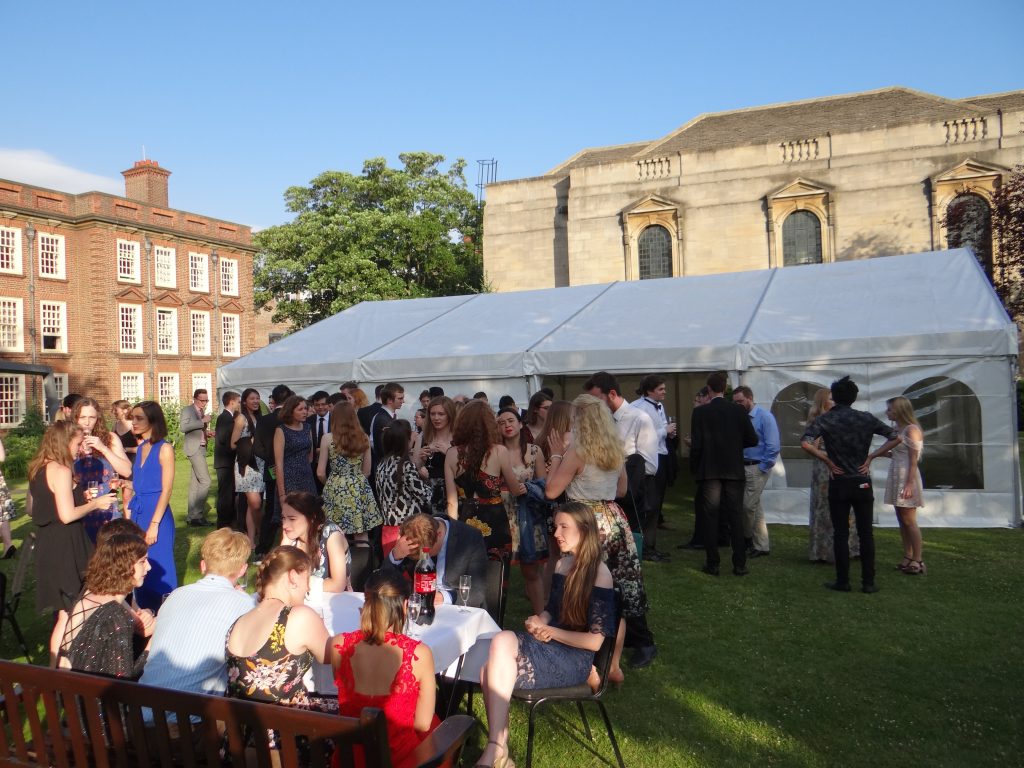
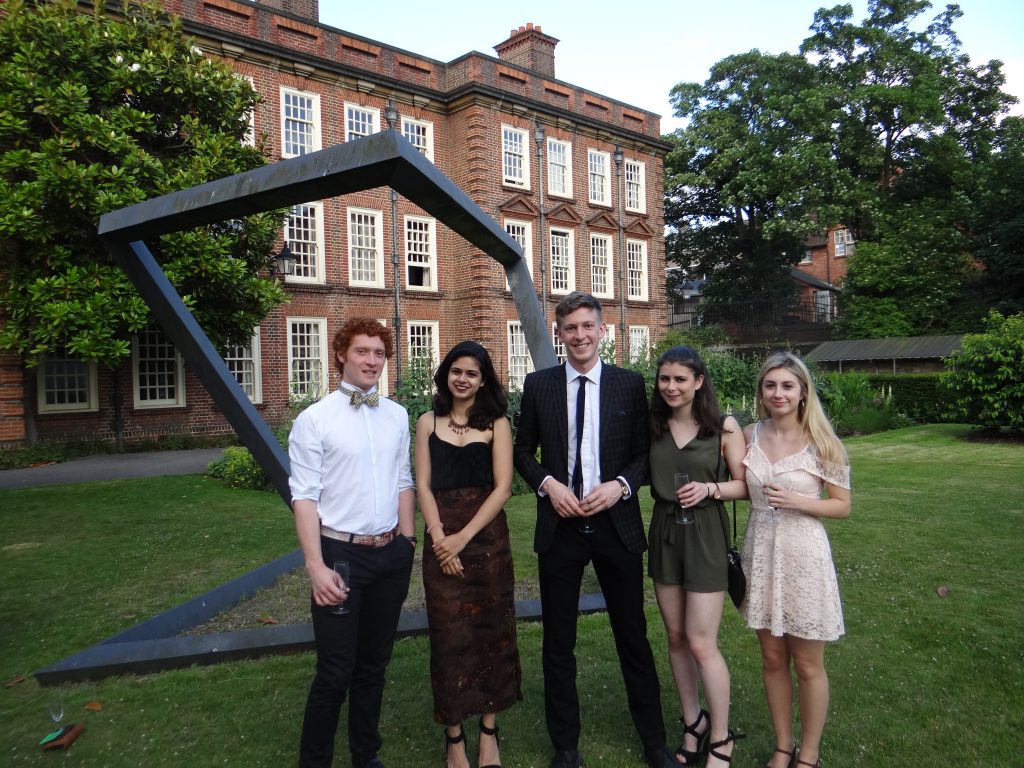
![DSC04045[1]](http://www.some.ox.ac.uk/wp-content/uploads/2017/06/DSC040451-1024x768.jpg)
